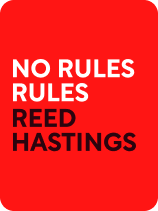

This article is an excerpt from the Shortform book guide to "No Rules Rules" by Reed Hastings. Shortform has the world's best summaries and analyses of books you should be reading.
Like this article? Sign up for a free trial here .
What is the Netflix radical transparency approach? How is this strategy implemented in real-life scenarios?
At Netflix, radical transparency is a way of life. Even when it isn’t easy or simple, Reed Hastings has committed to this level of candor with staff.
Read more about Netflix, radical transparency, and how it works in practice.
Netflix and Radical Transparency
In his book, No Rules Rules, Reed Hastings explains how important openness was at Netflix. Radical transparency is part of the culture. The following two scenarios walk through what that looks like in practice.
Be Transparent With Staff About Employees Who Are Fired
Dilemma: You had to fire a senior marketing employee because, despite producing good work, he occasionally put his foot in his mouth when he spoke internally to colleagues as well as externally to the public, and the issue became too big a liability for the company. When you let the employee go, he asked that you tell his coworkers that he left of his own accord. Do you respect his wishes, or tell them the truth?
Answer: Hastings advocates for being transparent with the people who benefit from knowing the truth, including the fired employee’s marketing colleagues. When employees know why their coworkers have been fired for work-related actions, they can avoid making the same mistakes. Furthermore, speculation is inevitable anytime someone is fired, so if you get in front of the gossip and share the truth, employees learn that they can trust you to be transparent. Although it’s tempting and common for company leaders to spin or obscure the whole truth, this is a sure way to erode trust among employees. At Netflix, radical transparency reduces the risk of speculation or spinning.
One Netflix manager had to confront this after firing an employee named Jake, who was being considered for a promotion. Some of the employees on Jake’s team revealed that Jake didn’t take feedback well and that he often retaliated inappropriately. Jake was ultimately fired for this, and his boss decided to inform the people who worked with Jake by sending an email explaining that Jake had not been displaying leadership qualities, nor had he been honest with higher-ups about certain incidents. The email acknowledged that Jake had done a lot of good work for the company, but that the boss felt confident that firing him was the right decision given the circumstances.
However, the lines are less clear when employees are fired or forced to take leave due to personal reasons, as was the case with one Netflix employee who had to take time off to go to rehab for alcohol addiction. In these cases, it’s still important to avoid spinning the truth, but don’t divulge as many details as you would for a work-related offense. For example, if an employee has to take a leave of absence to go to rehab, simply tell her team that she is dealing with personal issues, and let that employee choose how much information to share when she returns. The Netflix radical transparency approach takes account of key circumstances.
Regardless of the circumstances, the information you give staff should be a message that you’d feel comfortable sharing with the former employee.
Netflix Radical Transparency Approach Requires Admitting Your Mistakes
Dilemma: You’re the founder of a startup, and you’ve struggled to find a sales director who’s fit for the job—in five years, you’ve hired and fired five people for the position. You realize that the problem is your own poor judgment. Do you admit your mistakes to the staff?
Answer: Hastings had this exact issue when he was the head of Pure Software: He’d hired and fired five sales directors in just five years. He was embarrassed about his mistakes and felt inadequate about leading the company, so he admitted his failures to the board of directors and gave his resignation. Hastings felt a huge relief in owning up to the truth, and the board refused his resignation—in fact, they gained more confidence in Hastings’s ability as a leader, because they saw that he could recognize and admit his mistakes.
Everyone makes mistakes, and owning up to yours encourages employees to take risks despite the possibility of failure. At Netflix, radical transparency about your failures encourages people to innovate and learn from their mistakes rather than play it safe. Additionally, sharing your missteps builds trust with your staff and creates an environment in which mistakes are forgiven. Finally, on an individual level, research shows that being honest about your failures improves your health, relationships, and job performance.
Leaders often fear that being honest about their shortcomings will cause employees to lose faith in them. The pratfall effect states that the opposite is true as long as you’ve already built trust and proven your competency. However, if people already see your performance as inadequate, admitting your mistakes will only worsen their view of your abilities.

———End of Preview———
Like what you just read? Read the rest of the world's best book summary and analysis of Reed Hastings's "No Rules Rules" at Shortform .
Here's what you'll find in our full No Rules Rules summary :
- How Netflix achieved massive success in a short period of time
- The unusual business practices that have helped Netflix sustain its success
- Why Netflix fires adequate employees






